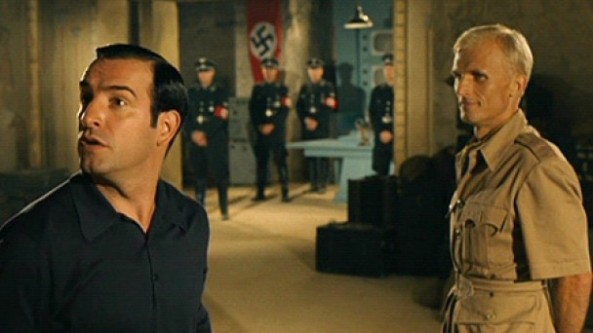What will we say about 2011 as a year for movies when the potential Best Picture winner quite literally doesn’t say anything at all?
“The Artist” was once the controversial contender for Best Picture. Not since the first Oscars in 1927 had a silent film won, and it was doubtful this French crowd-pleaser would be the one to change that.
The narrative even fit the tumultuous Academy landscape with the lop-sided number of nominees and changing rules in other major categories.
Now however, ‘The Artist” seems like the safe bet, and in just a few weeks since the nominations, the race has lost its energy as obvious frontrunners make their way ever closer to the podium.
The Oscars remain the last important awards ceremony, but the movies nominated need to reflect their significance.
Consider for a moment that of all the films nominated for Best Picture, not one is a dark, feel-bad movie like “Drive,” “Tinker Tailor Soldier Spy” or “The Girl With the Dragon Tattoo.”
There is also only one film, “The Help,” which grossed over $100 million at the box office.
And of those, only “The Descendants” or “Moneyball” can be called 21st Century films.
There is still something to be said about a silent film winning Best Picture, namely that a movie, in this case a foreign film that would typically be Best Picture poison, can be universal.
But the problem is that “The Artist” will not inspire a wave of silent films from young, aspiring filmmakers. It may temporarily generate some fascination in the silent era, but the nostalgia of Michel Hazanivicius’s film, as well as the many other backwards-looking films in 2011, is fleeting.
If something like “The Tree of Life” could win, heads would really turn. Films like “No Country for Old Men,” “The Hurt Locker” and “The Lord of the Rings” are all masterpieces in their own ways, but Terrence Malick’s film carries with it the aura that still belongs to “2001: A Space Odyssey.” Rarely is such an important film this close to being recognized as such by a populist voting body.
Short of ensuring that the best films always win, I’m struggling to think what the Oscars still need to do to remain relevant.
Many have criticized that the Oscars can seem like an old man’s club, and this year is no exception. The average age of the nominees in the Best Supporting Actor category is 62.6, and even the Best Director field is stacked with aging masters.
The Oscars could very easily slate younger if only they nominated Shailene Woodley, “Bridesmaids” or included performances by “The Muppets,” but part of what makes the Oscars special is that they are distinguished and made to be taken seriously. If the Oscars are anything, they are not the Grammys or the MTV Movie Awards.
There’s the thought to go back to five nominees, but even if nominating “Inception” and “Toy Story 3” meant little in terms of ratings, a changing, broader field of films has kept movies like “The Tree of Life,” “Bridesmaids,” “Tinker Tailor,” “Drive,” “Dragon Tattoo” and even “Harry Potter” or “Rise of the Planet of the Apes” in the conversation for long enough for them to actually be recognized.
Even if the nomination for “Extremely Loud and Incredibly Close” was infuriating, it at the very least created some buzz and actually got people out to see the damn thing.
Fixing the Oscars may not come easy, but it’s clear that something must be done to address the Oscars’ problems. They’re too important to just ignore.



